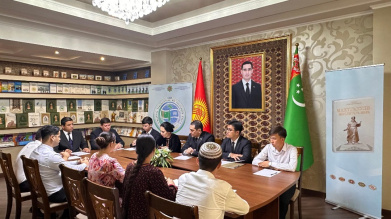Reforms will make Uzbekistan stronger and Central Asia more stable
12.04.2023 | 20:26 |The sustainable development of each Central Asian state, as well as the region as a whole, directly depends on joint efforts to resolve pressing issues, among which a special place is occupied by the integration of countries both within the region and beyond. All more or less significant events in any of the five states in one way or another have an impact on the whole of Central Asia.
On April 30, a referendum on the new Constitution will be held in Uzbekistan - and this is an event that will affect politics, the economy, the life of the state and society, thereby influencing countries neighboring in the region.
We offer the attention of the readers of the ORIENT website to the article by the head of the department of the International Institute of Central Asia Sherzod Faiziev, which is called “President Shavkat Mirziyoyev’s reforms will make Uzbekistan stronger and Central Asia more stable”:
"The message of the President of Uzbekistan to the Parliament in December 2022 became one of the main political events of the past year, which not only outlined the most important tasks and main directions of work of all branches of government for 2023, but also identified key priorities for further reform and modernization of Uzbekistan for the coming period.
The central place in the speech of Shavkat Mirziyoyev was occupied by the topic of building a New Uzbekistan, in which the highest value should be a person, his honor and dignity, rights and freedoms, where a free, comfortable and prosperous life of a multinational people is ensured.
The priorities outlined by the head of state are ambitious. Despite the great progress that has been made over the past six years, the tasks set by him are possible only with the active participation of society, our citizens and, of course, with the hard and productive work of all branches and levels of government, the potential of which requires further development.
As part of the practical implementation of the goals set, the need was noted for the country's transition to a new model of the political system, which would create conditions for achieving the set goals. In this context, one of the priority tasks Shavkat Mirziyoyev called the improvement of the Basic Law, which will have to meet the modern development of society:
“In order to bring the development of the country to a new stage, it is necessary to change the management system, and legislation, and our society. If we do not do this, if we continue to ignore obvious problems, then we will fall behind life and progress. We need to develop a modern Constitution, imbued with the goal of ensuring the interests of a person, respecting his honor and dignity as the highest value, such a Basic Law, which will fully comply with the tasks of building New Uzbekistan, will serve future generations.”
Undoubtedly, the implementation of the adopted New Development Strategy of Uzbekistan for 2022-2026 and the construction of a just state that truly respects the people require constitutional reforms aimed at improving the work of power as such. The priority in this case was considered the harmonization of the Constitution with the modern realities of society.
As part of the events initiated by the authorities - a wide discussion and popular debate related to the improvement of the Basic Law, a total of 220,000 proposals for changing it were received.
The amendments made to the draft document, in fact, have incorporated all the necessary and missing parts for a complete reformatting of the Constitution, which should meet new realities and be tailored to new tasks.
Along with a large number of changes (more than 65 percent of the Constitution), which are designed to supplement and specify the rights and freedoms of citizens, balance the system of power and authority, improve conditions for the full development of the citizen and society as a whole, Chapter IV, which formulates the principles and approaches of Uzbekistan's foreign policy, was also subjected to a qualitative change.
The new version of the Constitution includes the thesis that “Uzbekistan pursues a peaceful foreign policy aimed at the comprehensive development of bilateral and multilateral relations with states and international organizations” (See the newspaper “Narodnoye Slovo” No. 52-53 of March 15, 2023).
The integration of this important and, at the same time, fundamental message into the Basic Law is not accidental and in many respects is a reflection of the current state of the world, which is characterized by the rapid growth of distrust between leading states, the militarization of international politics, and an open demonstration of force in building relations.
Here it is appropriate to quote the words of Shavkat Mirziyoyev, which were made at the SCO summit in Samarkand last year. Then the head of state noted that humanity is in "a period of historical break, when one era ends and another begins - even more unpredictable and unknown."
In the current difficult conditions, the role of regional communities united by established economic and humanitarian ties and, at the same time, long-term plans and projects aimed at further strengthening interconnectedness, is critically important.
In this context, the Central Asian region should be especially noted, which in recent years, thanks to the efforts of all five countries - Kazakhstan, Kyrgyzstan, Tajikistan, Turkmenistan and Uzbekistan, is rapidly changing, gaining stability, unity and international subjectivity.
Undoubtedly, the decisive factor that triggered the processes of building up cooperation in Central Asia in recent years was the new foreign policy course of Tashkent, which received its formalization after Shavkat Mirziyoyev was elected president in 2016.
In his first message to the parliament, the head of Uzbekistan outlined a hierarchy of priorities, putting in the first place the strengthening of relations with the countries of Central Asia. This approach was further developed in the adopted Action Strategy of Uzbekistan for 2017-2021.
This document indicated Tashkent's intention to pursue an open and constructive policy towards its closest neighbors, to resolve regional issues and problems on the basis of equality, mutual consideration of interests and the search for reasonable compromises, to create around Uzbekistan as a country located in the heart of the region, a belt of friendship and prosperity, security and stability.
Changes in the foreign policy of Tashkent created the conditions for the formation of a healthy political climate in the Central Asian region and caused consistent and, at the same time, cardinal improvements both in interstate relations and multilateral interaction formats.
The implementation of a new policy based on the principles of mutual trust and good neighborliness has contributed to progress on many old issues. This made it possible to achieve the removal of most of the problematic issues that for many years were a conflict topic and hampered the projects and initiatives necessary for the development of the countries of the region.
Over the past six years, conditions have been provided for the phased completion of the legal registration of the state borders of Uzbekistan with Kazakhstan, Kyrgyzstan and Tajikistan, checkpoints for citizens at the Uzbek-Tajik and Uzbek-Kyrgyz border checkpoints have been resumed, visas with Tajikistan have been canceled, and transport links have been launched - by rail, air and land, which were interrupted in the mid-90s. Corridors were opened for the export of goods.
Moreover, investment cooperation has intensified, the implementation of significant cooperation projects in trade, industry, energy, transport, agriculture and other sectors of the economy has begun. If we talk about trade, it has increased by more than 2.5 times. The number of joint ventures increased by more than 5 times - from 312 to 1600.
All this created conditions for the transformation of the region into a single trade, investment, transport and communication platform. Projects of industrial cooperation are being implemented in various sectors of the economy, from the automotive industry to agriculture. Contacts between the regions of states are expanding, cultural and humanitarian ties are deepening.
Today, stable Central Asia is already becoming one of the important centers of investment activity and economic growth. According to some experts, the total GDP of the countries of the region has grown by 20 percent over the past five years and exceeded $340 billion.
Speaking in the context of Uzbekistan only, the trade turnover with the countries of the region increased to $7.4 billion. The same dynamics of cooperation is observed in neighboring countries.
The result of the general changes in Central Asia was the consistent development by the states of coordinated positions on intra-regional issues and close coordination on international platforms - the UN, the CIS, the SCO, the OIC, the ECO and other platforms.
Thanks to this transformation, in recent years, the countries of the region have also developed a common approach to building relations with leading states and centers of power within the framework of the Central Asia Plus dialogue format - the European Union, India, China, Russia, the United States, South Korea, Japan, the Arab states of the Persian Gulf (GCC).
Of course, the role of Uzbekistan in these processes is of paramount importance and is not in doubt, which is confirmed by numerous assessments of foreign experts and specialists. (See International Conference "Central and South Asia: Regional Interconnectivity. Challenges and Opportunities" (July 15-16, 2021, Tashkent). Tashkent - 2021, Collection of speeches).
The consolidation of the thesis of a peaceful foreign policy in the Constitution of Uzbekistan should be considered as a fundamental change that demonstrates not only the great responsibility and maturity of the state, but also an understanding of the prospects for developing cooperation with its neighbors in the region, with which the country is united by a common history, common values, culture and religion.
Indeed, Uzbekistan needs to continue systemic and fundamental changes both within the state and in Central Asia. This is a most difficult task, which is not limited to the adoption of amendments to the Constitution, but only begins with them.
Properly formulated goals and their no less consistent implementation become an important factor in the sustainable development of the entire region. The deepening of interconnectedness with our neighbors is already underway and the continuation of this vector will make Uzbekistan stronger, and the Central Asian region more stable and sustainable.
ORIENT news











